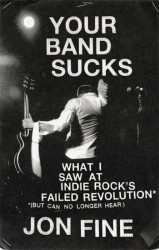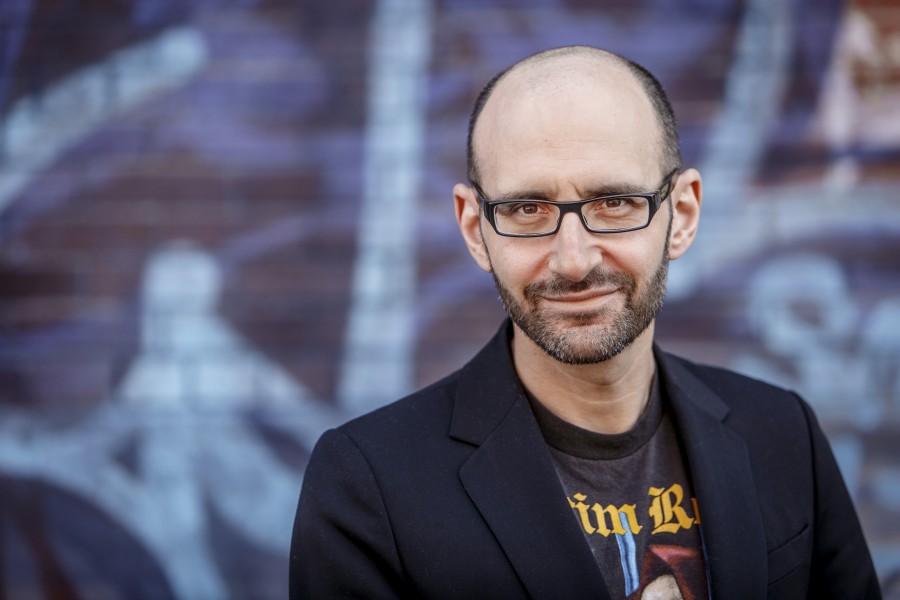In the late 1980s, Jon Fine was a founding member of a band that even he admits is obscure.
Fine started Bitch Magnet with two pals as a student at Oberlin. While the group sold modestly and toured the U.S. and Europe, it still lurked in the underground. That wasn’t a problem for Fine. He didn’t have arena aspirations; he wanted “just enough” people buying and listening to his records.
 The musician’s new memoir/scene report, Your Band Sucks: What I Saw at Indie Rock’s Failed Revolution (But Can No Longer Hear), details his angst-ridden, pot-selling adolescence in New Jersey, the triumphs of starting a band, the subsequent weirdness of getting kicked out of his own band — and the forces that reunited the group decades later.
The musician’s new memoir/scene report, Your Band Sucks: What I Saw at Indie Rock’s Failed Revolution (But Can No Longer Hear), details his angst-ridden, pot-selling adolescence in New Jersey, the triumphs of starting a band, the subsequent weirdness of getting kicked out of his own band — and the forces that reunited the group decades later.
In Your Band Sucks, Fine (who’s also played in Coptic Light and Don Caballero, and now edits Inc. magazine) weaves interviews with other scene-dwellers with his own experiences, telling stories about gross band vans, hearing damage and everything in between. And while Fine explores bands that positively impacted him, he spares no criticism of those he hated: specifically a certain Midwestern band whose frontman is Billy Corgan.
Before Fine comes to D.C. to discuss his book at Busboys & Poets in Brookland Tuesday evening, Bandwidth chatted with the author about his writing process (hint: he had to be convinced that this was a sellable idea), what it was like to be honest with himself about his shortcomings and his contempt for — I’ll just say it — The Smashing Pumpkins.
This interview has been edited for clarity and brevity.
Bandwidth: So you had already planned to write this while Bitch Magnet reunion talks were ramping up?
Jon Fine: My agent and I had been talking about an entirely separate idea. I had a lunch coming up with Rick Kot, who’s an editor at Viking. I start doing this whole song-and-dance about this book idea that I’ve been talking about with my agent. By the way, totally different book idea — this was not the book. [It was] a completely different thing that had to do with food and agriculture, and he’s completely underwhelmed, not interested at all.
He starts asking me, “What else are you doing?” meaning, “I’m not at all interested in this thing you’re excited about.” So I told him… “This band I was in in the ’80s and ’90s — we broke up in 1990, but our records just got reissued and we just got asked to reunite for this festival in the U.K. called All Tomorrow’s Parties.” He’s like, “Really? That’s interesting.” Finally he was like, “That’s the book. Write that book.”
Why the interviews [with other people]?
The story of a guy who’s played in bands that you haven’t heard of is not really of interest except to very few people. That’s fine. It’s really important that this book rings true to that core crowd. I just wanted to have a little more scope to it. It may be a little tiring to spend 300 pages with one person if that person is me, perhaps.
I wanted to hear, “What was it like for this band in San Francisco?” I wanted to talk to people who, in one way or another, had a flirtation with major labels and maybe even had an actual hit. I really wanted to find people that had an experience that had something in common with mine. But also people [who] at a certain point were like, “Well, this is great, but I’ve been doing it for 10 years, and if I don’t learn any actual life skills, I’m in a lot of trouble.” … I mean like, “I can’t really pay rent now, or, “I’ve never had a real job at 35 years old. What the f**k do I do?”
“If you’re writing a book like this, if you’re going to be enough of an a**hole that someone’s going to want to listen to you for 300 pages, you’ve gotta be honest about your own shortcomings. You gotta let that s**t hang out.”
You’re not afraid to talk about bands you don’t like. Why was that important to include?
I didn’t want to dance around it. Rule No. 1: You have to — I hate to say this because it sounds really highfalutin so if you use it, please note that I’m aware of it and it sounds really preposterous, but it’s true — if you’re writing a book like this, if you’re going to be enough of an a**hole that someone’s going to want to listen to you for 300 pages, you’ve gotta be honest about your own shortcomings as much as possible. You gotta let that s**t hang out. I hope I did that.
But also I think if I’m talking about how deeply I feel about this music, it sort of exists in a vacuum unless you say, “And there’s this stuff, which I don’t like.” I was a child of the ’80s. I graduated from high school in ’85, I graduated college in ’89. The dominant musical cultures were British synth pop and hair metal, and it was really awful.
I say this in the book: Howard Jones had a really annoyingly bouncy, upbeat song called “Things Can Only Get Better.” I was a pissed-off 16-year-old in high school and I was like, “This is actually a lie. Things aren’t going to get better. What if they get worse? This is bull***t. Why are these people lying to me?” It sounds really childish now, but that’s what punk rock comes from — all this stuff on the radio, all this stuff on MTV is bull***t, there’s gotta be a better, purer way to do this.
I just felt these chapters would read weak and like I was holding back something if I didn’t say that, “Oh, by the way, The Smashing Pumpkins became a huge band that came out of the scene, and I found that really baffling.”
You mention Smashing Pumpkins a lot — is that the one band that embodies everything you hate?
A band like — this is obvious — Limp Bizkit or Nickelback is probably closer to something that embodies everything I hate. Everyone pretty much knows those bands suck. One of the weird things that has happened in doing a few interviews for this book is I don’t understand why some people are acting like it’s a big deal that not everybody likes The Pixies. I just don’t get that. I just don’t think they’re interesting. [But] I don’t think Smashing Pumpkins are the worst band in the world, they don’t embody everything I hate.
“I stepped away [from music], I got a job. To a lot of people I know, that’s kind of a happy ending. To me, I’m like no, actually, that was a big failure.”
You’re also not afraid to paint yourself as the villain of certain situations.
You gotta be real about that. As life goes — I’m really lucky, I’ve got a great wife, I’ve got a job that I’m really into, I got to write this book, which is just crazy. But I wanted to be really clear about this: There was a time when I really had to step back from music. It wasn’t working; people weren’t liking what I was doing. And not liking it in the major-label contract way, but not liking it, like, five people at every show. I stepped away, I got a job. To a lot of people I know, that’s kind of a happy ending. To me, I’m like no, actually, that was a big failure. Not only was it a big failure, but I chickened out.
You’ve got to believe me — I’m not a terrible person to be in a band with. I’m sure it wasn’t always a picnic when I was 19. I mean, I got kicked out of the band that I started, you know? There’s probably something to that that may go beyond the fact that we were all 19 and 20 years old and we couldn’t really communicate very well and that I was a loudmouth.
On the other hand, I don’t think my bands got pushed around by all that business bull***t that happened. If I was hard to be in a band with, it wasn’t that I was getting drunk and trashing cars or nodding out on dope and forgetting about shows, [it was] because I was determined that we were gonna do what we set out to do. And I was going to make sure we did it to the best of our ability.
Talk to me about the subtitle, “Indie Rock’s Failed Revolution.” I got the feeling that it’s hyperbolic, or perhaps inaccurate, after reading the book.
When I was thinking “revolution” when I was young and naïve enough to think that, I wanted us to basically take over. I wanted us to be running things. I wanted the big institutions, FM radio and big major labels to be run differently. I thought somehow that could all happen. It was heartbreaking to me when that didn’t happen, even though it couldn’t have.
By the end of the ’80s there was a circuit where bands like [Black Flag] could thrive and exist. I’m out of the game, but I know that still exists. There are a million bands and places to play in every city, and while we’ll take a moment to pour one out for all the old, great record stores that aren’t there anymore, there’s generally a really good record store in every town. You can pretty much get any record you want — you can find out about it. All those things are huge.
It’s important to me still that there’s a place for this. That wasn’t really possible in the early ’80s. That is huge. But at the same time, I wanted the statues to be toppled, I wanted — I don’t know what the f**k I wanted. I wanted us to be doing what they were doing. I had the idea that somehow, it would be different. Again, naïve beliefs — and it’s incredible that we have this place for this kind of stuff, but I think I wanted something more.
“I wanted the big institutions, FM radio and big major labels to be run differently. I thought somehow that could all happen. It was heartbreaking to me when that didn’t happen.”
What do you want someone to take away from reading your book?
To me, this is a really important time in American culture. There’s just something really universal and American about it. To me, there’s a really great American story, period. To me it’s just fascinating what people I knew did, and it was just fascinating the way this culture was handled. I don’t think you have to be as deranged about music as I am — and you probably are — to like it, I hope.
This is really awful what I’m about to say — it’s a generation coming of age. It’s a very specific cohort of America coming of age in a specific way and growing up and dealing with all the complications that come with that. Obviously, I found it endlessly fascinating because I spent years writing it. It’s the really classic, undertold American story, and I hope some people agree with that.
Jon Fine discusses his book with Washingtonian‘s Andrew Beaujon at Busboys & Poets in Brookland June 23.


